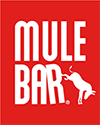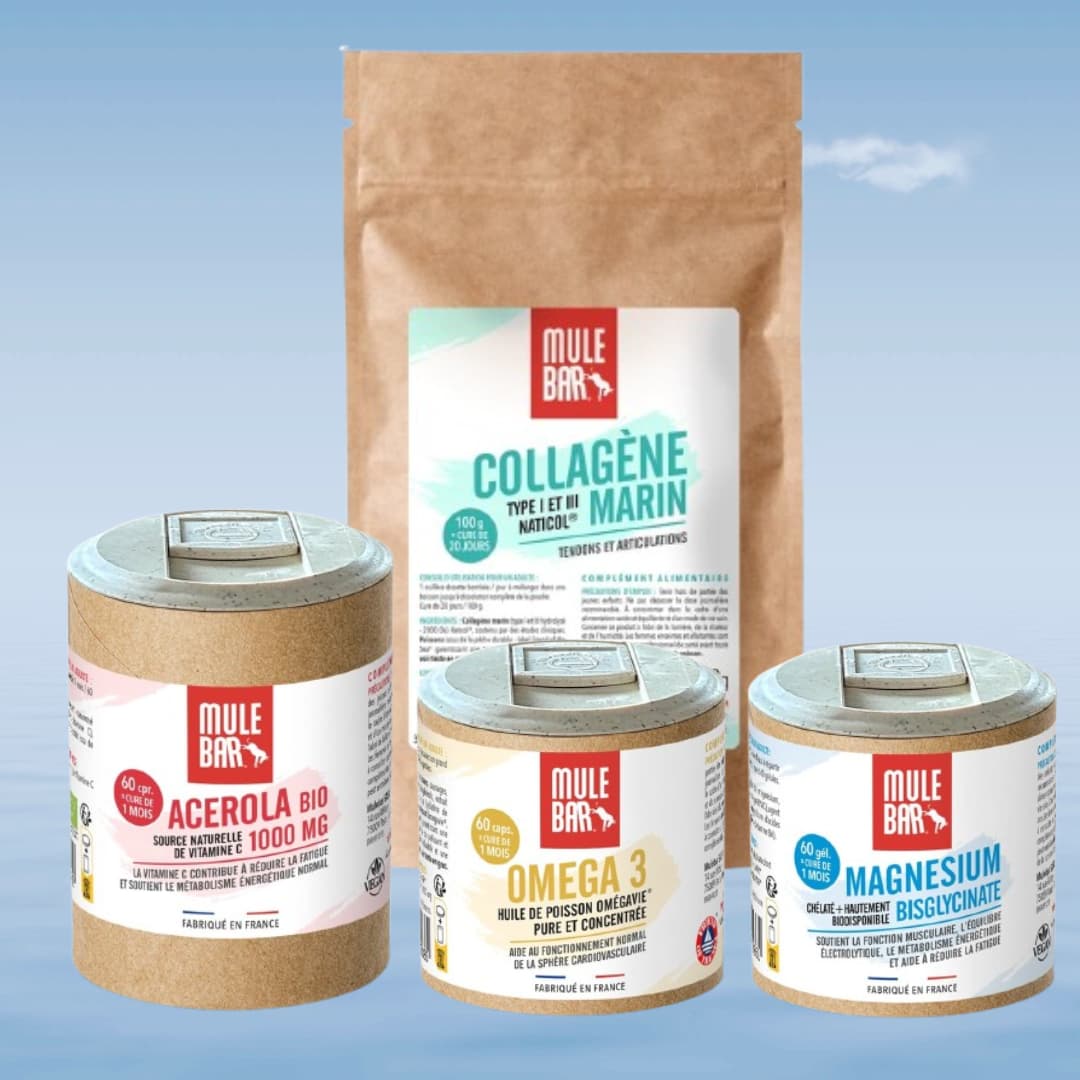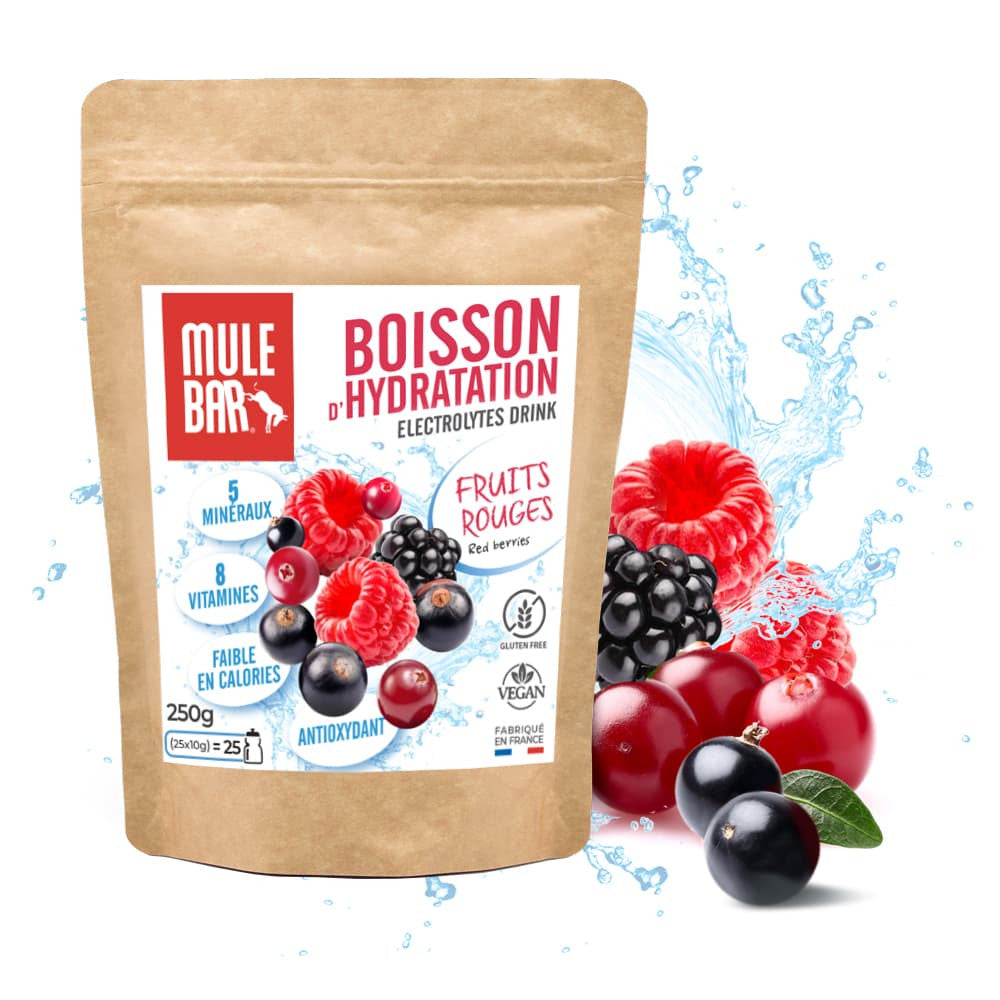
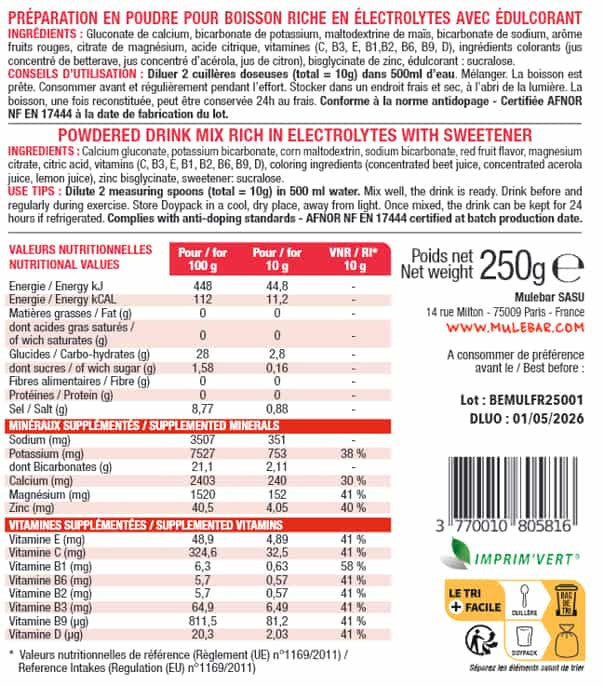
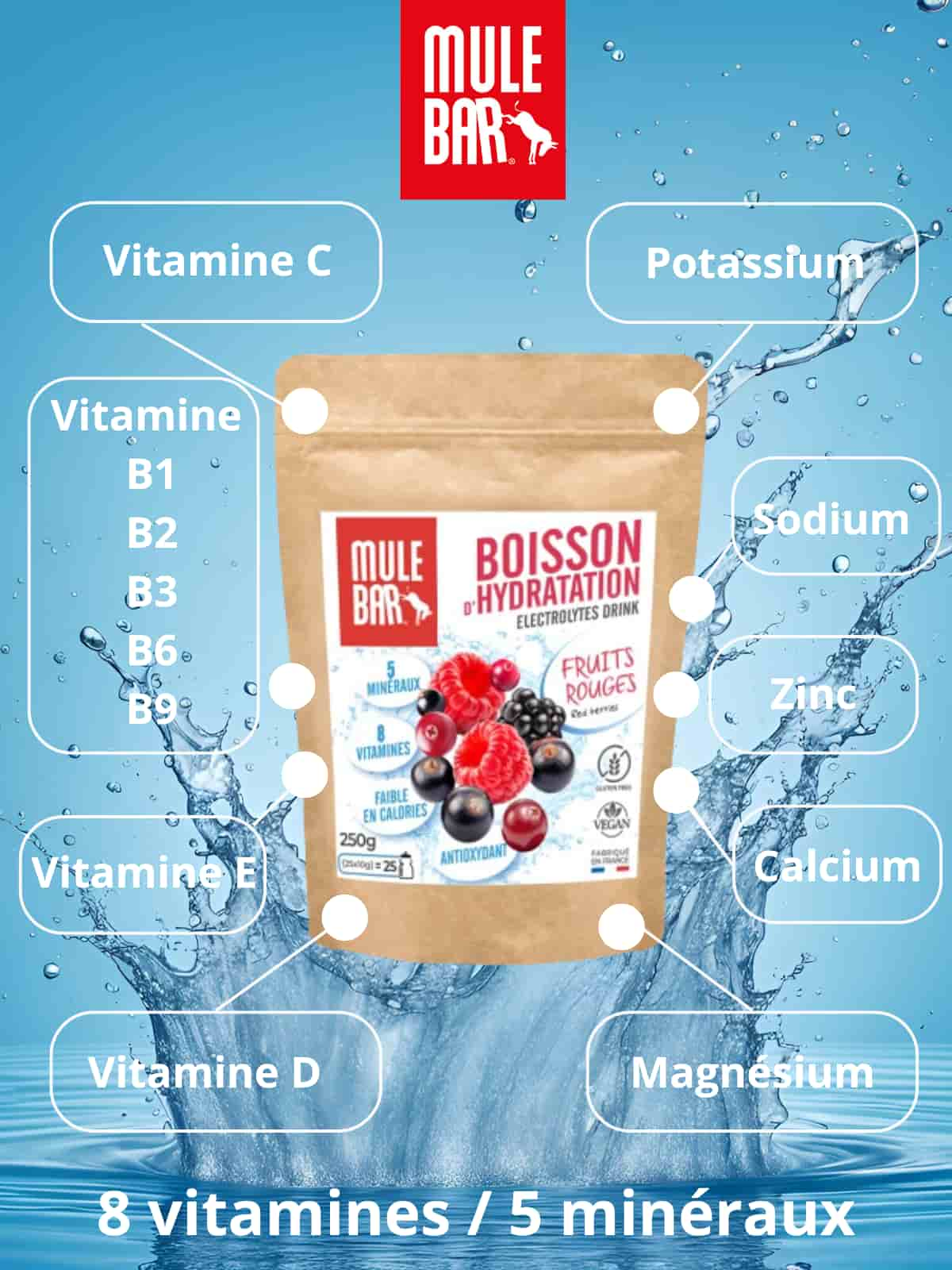
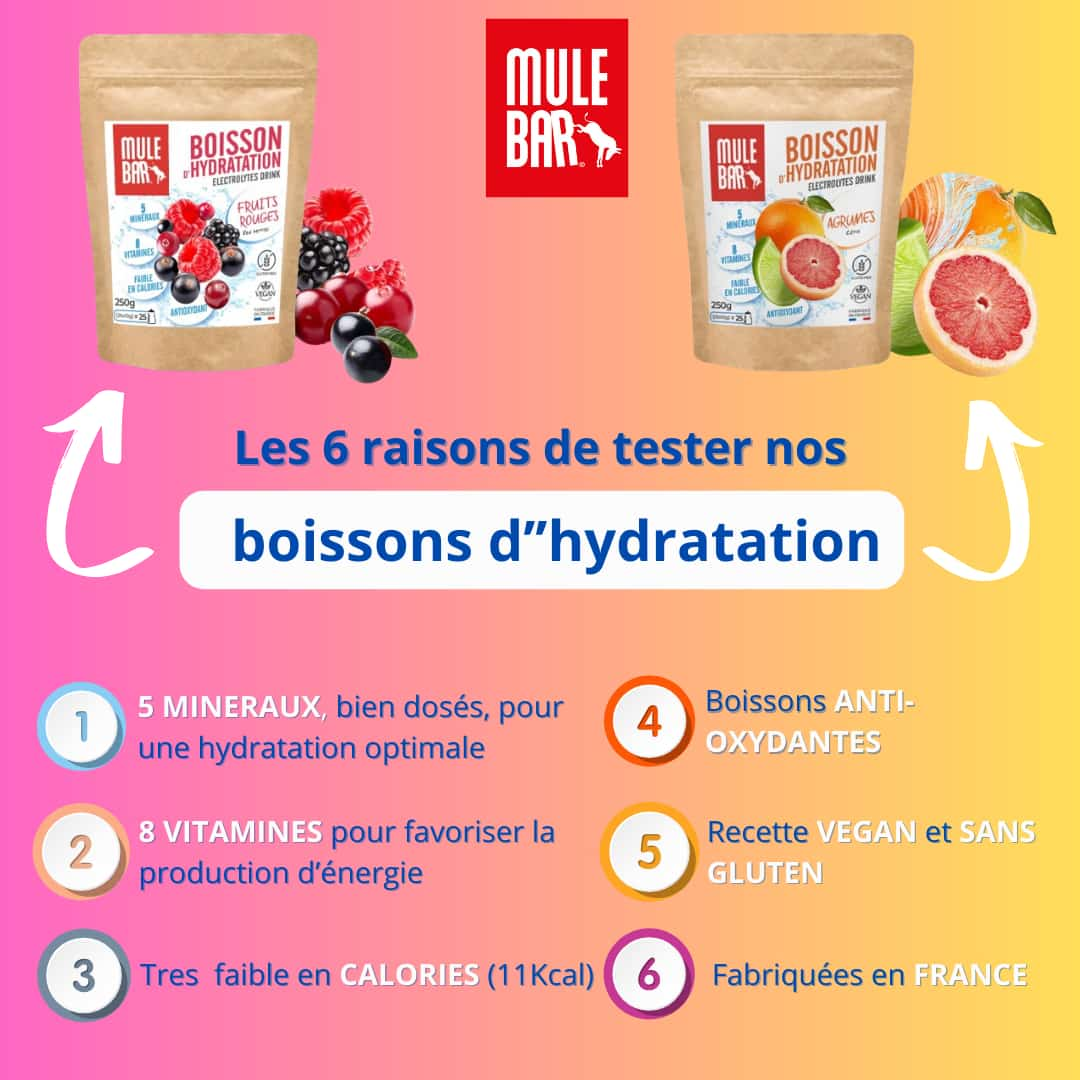
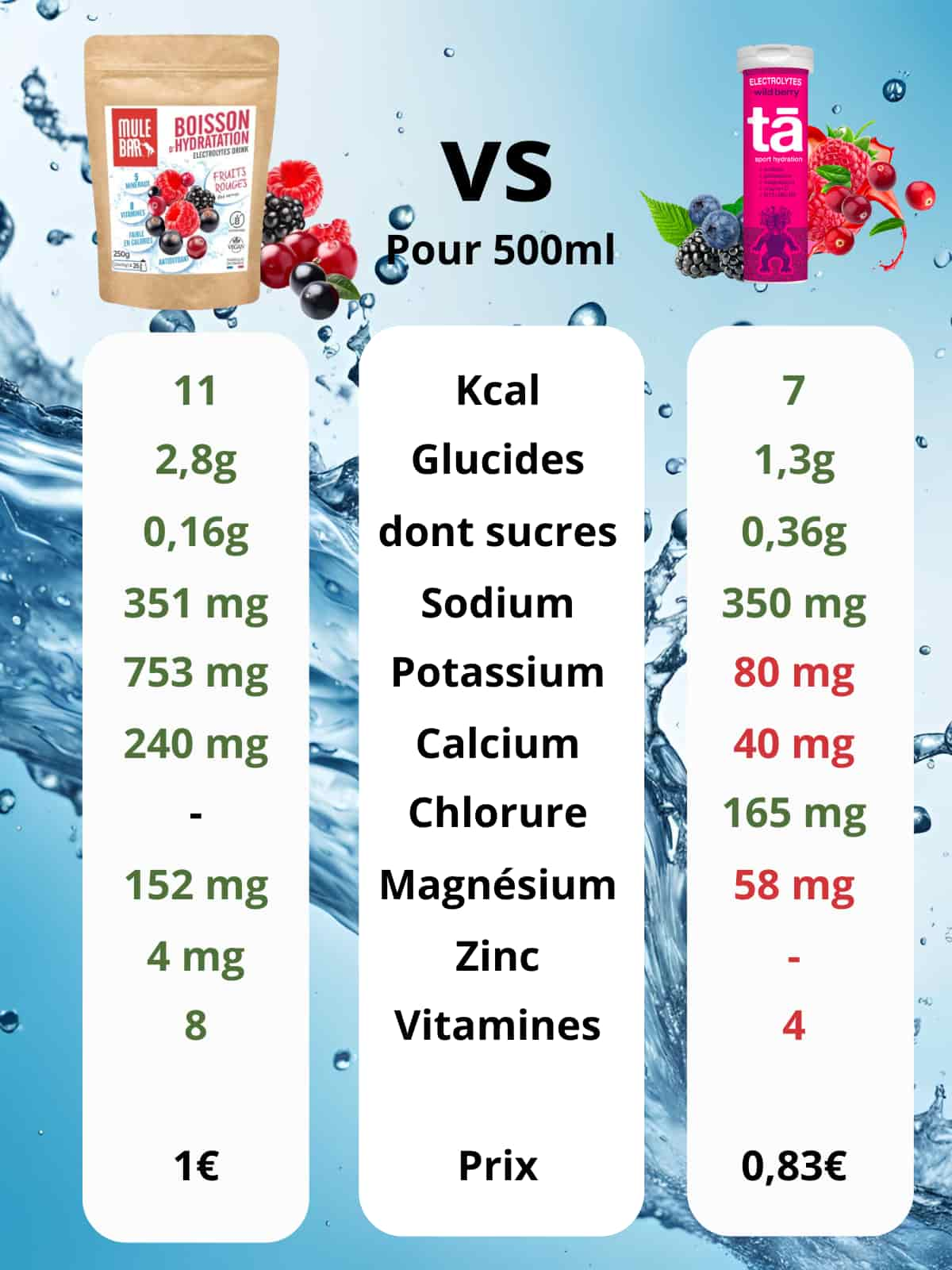
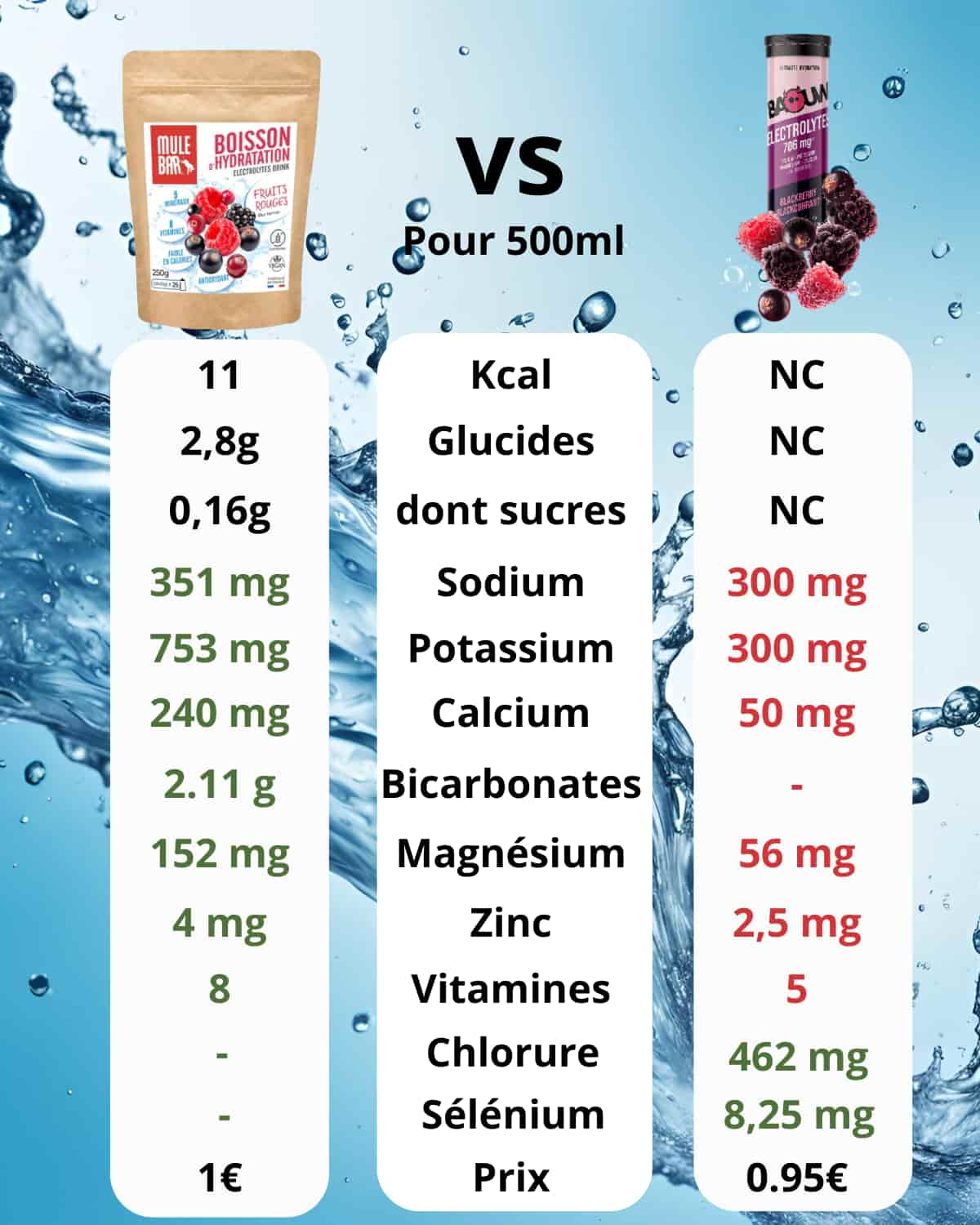
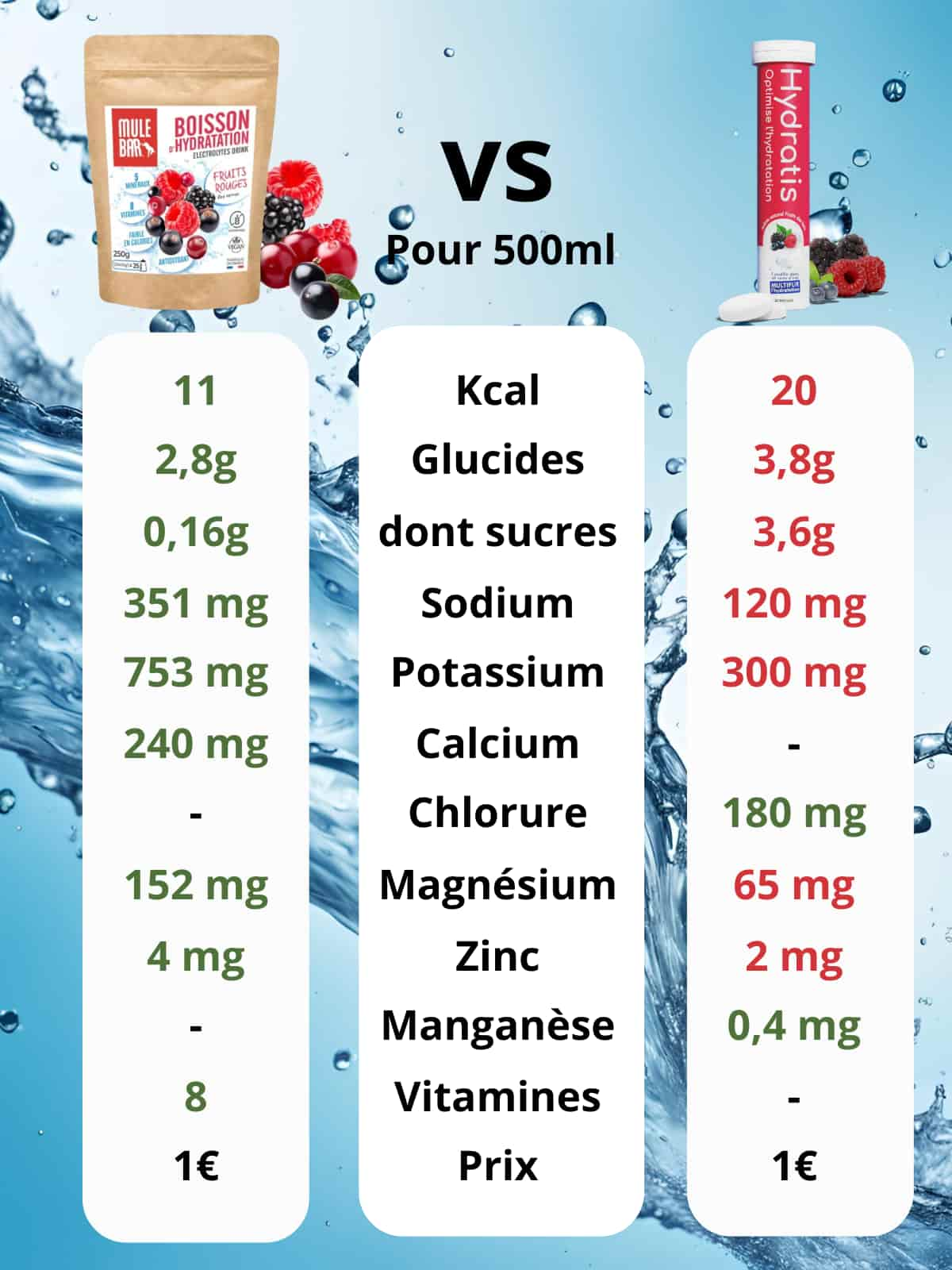
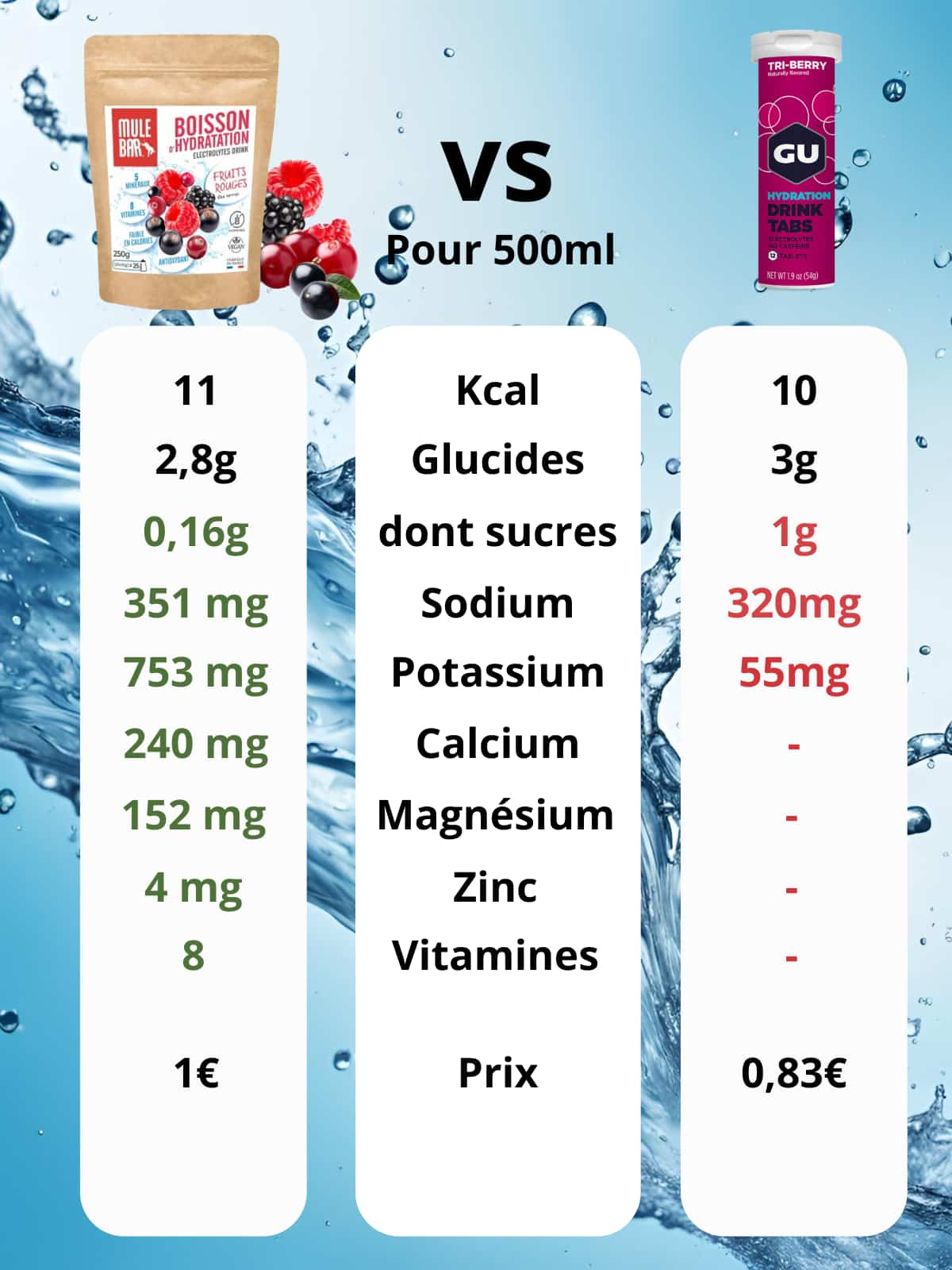
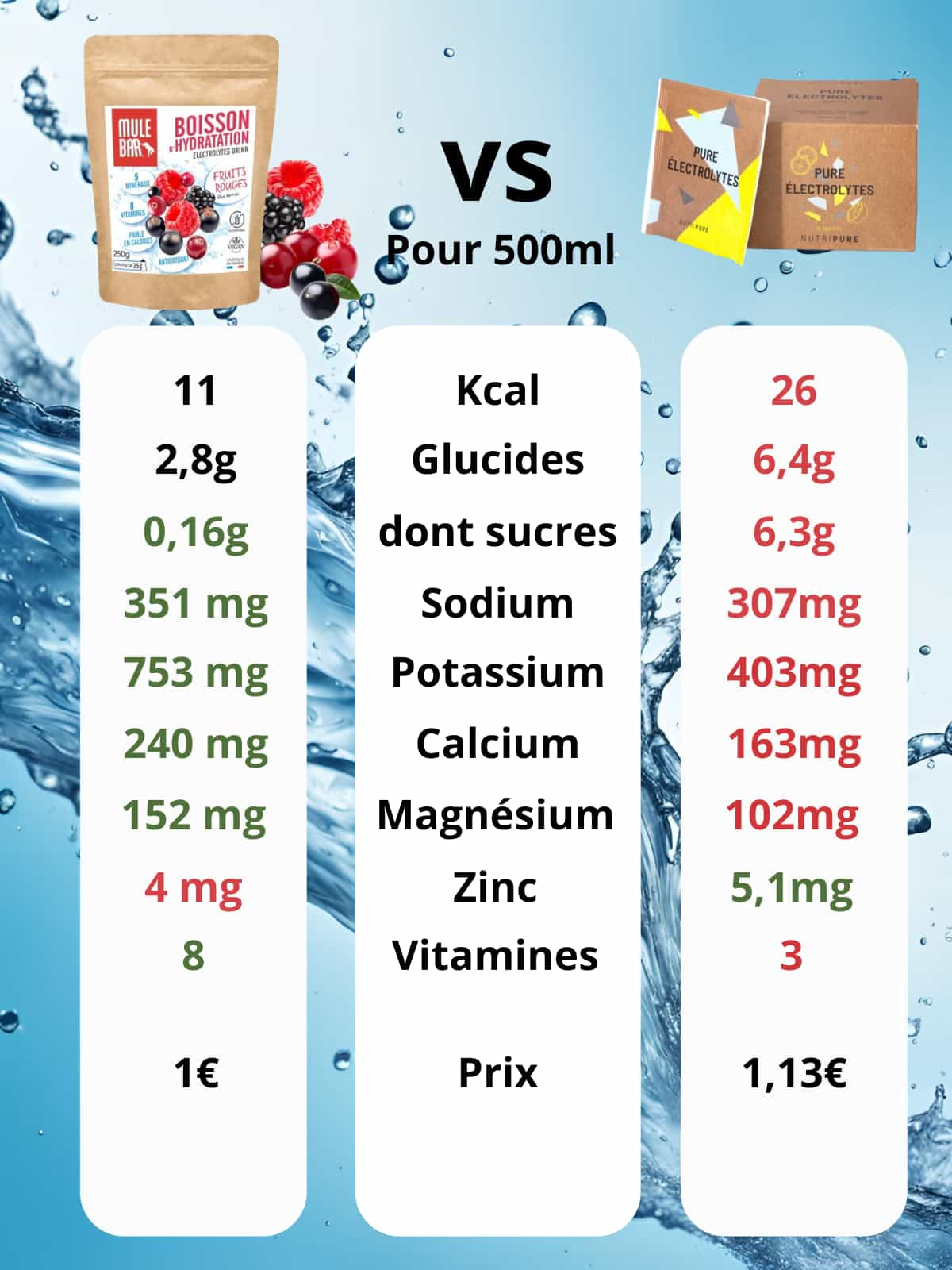
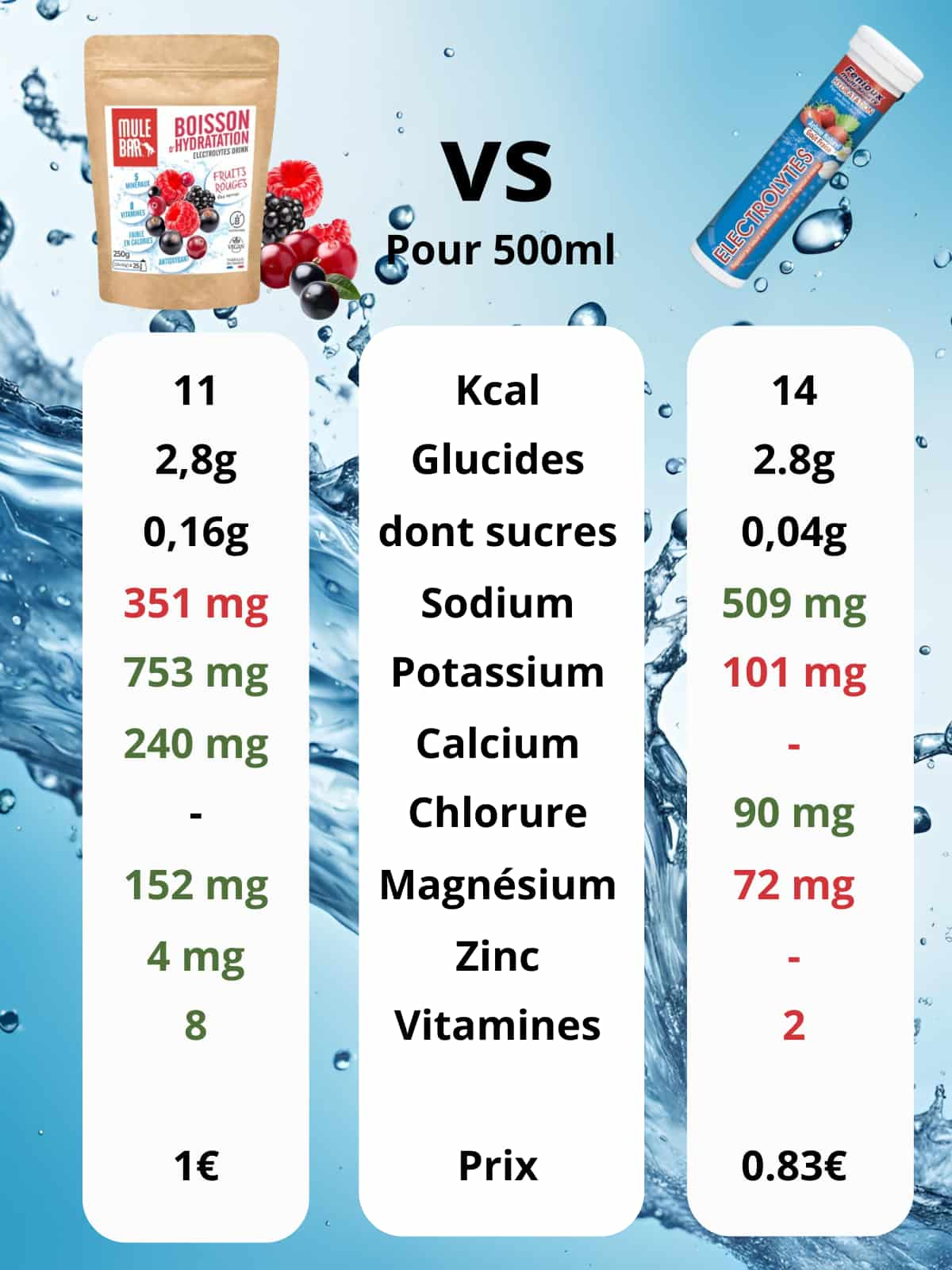
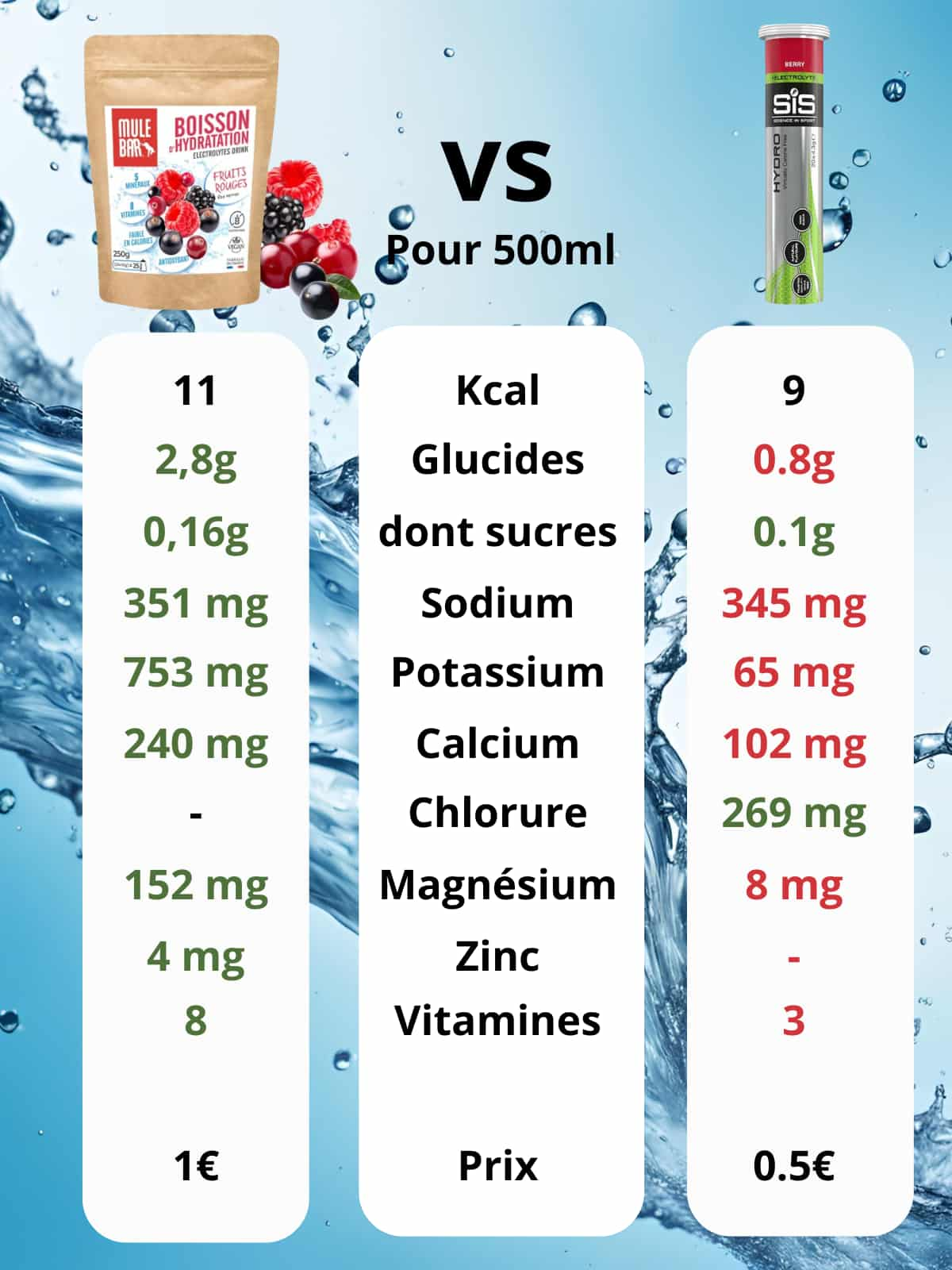
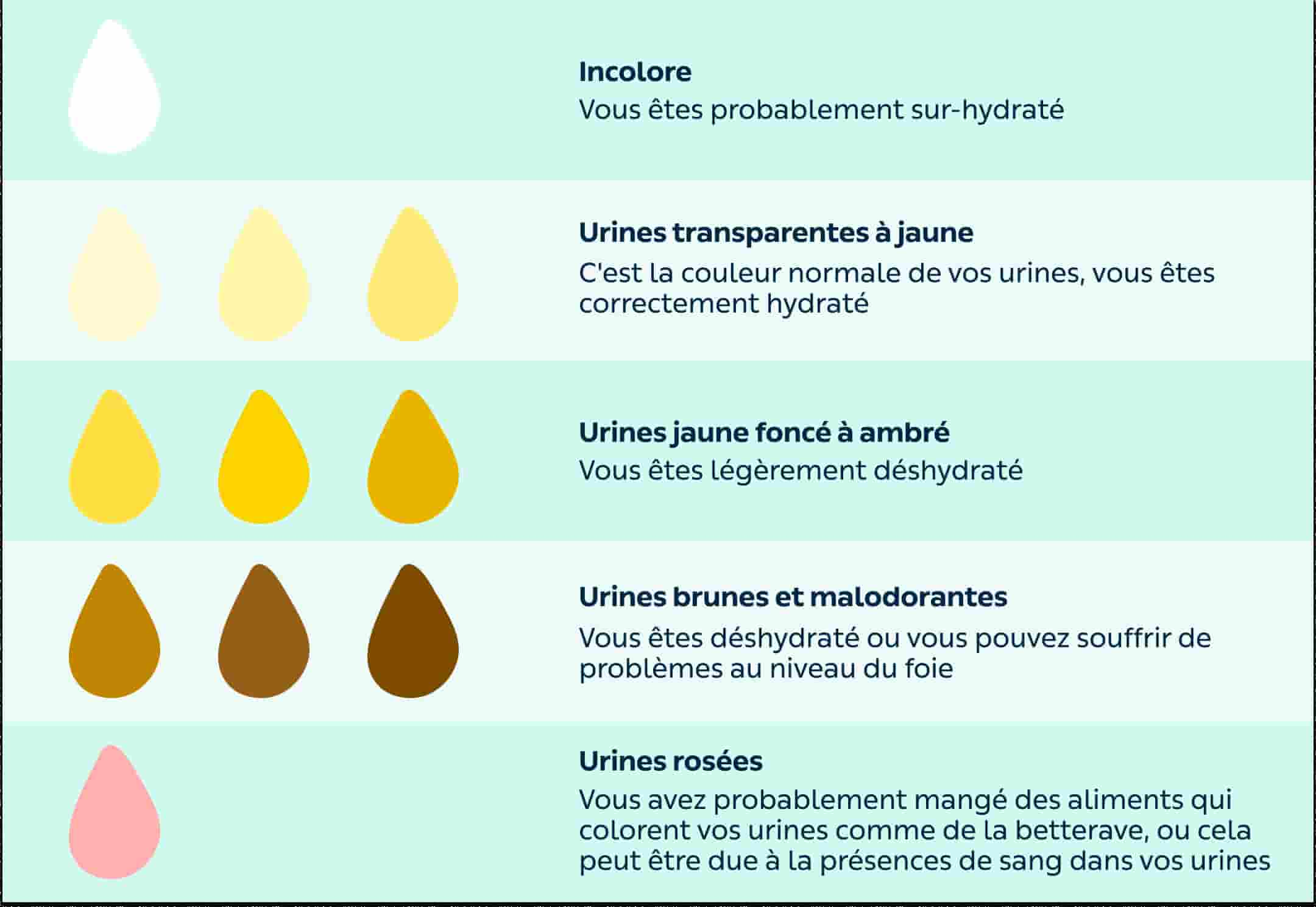
Mulebar electrolyte drink 250g / Red Berries
- 100% natural ingredients
- Promotes hydration and reduces fatigue
- AFNOR NF EN 17444 anti-doping label
- Plant based and gluten free
- Made in France
- 250g = 25 doses of 10g = 25 bottles of 500ml
- 2 to 5 working days delivery In Europe
- Best before : July 1st 2027

Description
Mulebar red berries electrolyte drink enriches water with minerals, trace elements, and vitamins. This allows your body to absorb it more quickly and efficiently while promoting muscle recovery (antioxidant effect).
The Mulebar hydration drink helps reduce fatigue.
Good hydration is the secret to a healthy body, even for sedentary people.
Prefer powdered drinks over effervescent tablets which contain much fewer active ingredients.
Very, very slightly sweet taste, so not cloying.
Low energy intake: only 11.2kcal per bottle
How do electrolytes Work ?
Electrolytes are mineral salts present in our blood and cells. Sodium, potassium, calcium, zinc, and magnesium are the most important for athletes. They disappear from our body through sweat, which will be more significant the more intense the effort and/or the higher the external temperature. This is why it is absolutely necessary to replace them by consuming an electrolyte drink, also known as a hydration drink.
Mineral salts play a crucial role in our body:
- Proper muscle function: They allow better tonicity of muscle fibers to contract and relax.
- Hydration regulation: Sodium helps regulate the amount of water in our body. Replenishing electrolytes allows the body to retain more water, improving hydration, especially during physical effort.
- Maintaining pH balance: Mineral salts conduct an electric charge, thus contributing to the acid-base balance in body fluids.
The addition of vitamins helps speed up metabolism, which is the production of energy (see the benefits tab).
Finally, a hydration drink generally does not contain carbohydrates and remains very close to zero calories. It is therefore an ideal drink for those who want to lose weight or athletes who consume energy bars, energy gels, or energy compotes in parallel.
What is the difference between a hydration drink and an energy drink?
Our electrolyte-based powder has two objectives:
- Facilitate hydration by promoting the assimilation of water by the body thanks to minerals, trace elements, and vitamins.
- Compensate for the loss of minerals through sweating.
Its role is not to provide energy through carbohydrates and proteins (BCAA) as an energy drink does.
The two drinks are therefore complementary.
If you consume energy bars, energy gels, or energy compotes during your effort, then the hydration drink may suffice.
What are the effects of dehydration on your body?
Here are some examples of the effects or consequences of dehydration on your body. As a reminder, it is recommended to drink at least 1.5 liters of water per day for an adult. You should not wait until you are thirsty, especially for seniors who gradually lose the sensation of thirst and of course for athletes.
- Significant drop in blood pressure, which forces the heart to beat faster. The more the heart tires, the more sensitive we are to heat strokes. Hence the need to drink very regularly during heatwaves.
- A lack of water in the body promotes high blood pressure, anxiety, bad mood, headaches, attention loss, memory lapses, and fatigue.
- Dehydration of muscle cells which end up being less productive or even causing cramps. Lactic acid is poorly evacuated due to lack of water and remains in the muscles. This will of course impact the quality of post-exercise recovery for athletes.
- Poor digestion with symptoms such as bloating, constipation, or acid reflux. Drinking enough water helps digest more quickly and eliminate waste and toxins.
- Skin problems. Dry skin, irritations, inflammations (acne, psoriasis, eczema), and premature skin aging are possible consequences of repeated poor hydration.
- Weight gain. Lack of water sends a signal to the brain that can easily be associated with a feeling of hunger and thus lead to snacking.
The last piece of advice, which seems obvious, is to replace sodas and sugary drinks of all kinds (including juices) with water as much as possible. Many people have difficulty drinking water because they find it lacks taste. This is why our Mulebar dissolvable powders are flavored (red fruits and citrus) without containing sugar (less than 0.2%). So enjoy yourself!
Benefits
A cocktail of 8 vitamins each with their benefits:
B vitamins:
They facilitate energy metabolism, which is the release of energy contained in food. They also prevent mental fatigue by stimulating the central nervous system. Most B vitamins are not stored in the body in sufficient quantities.
- Vitamin B1 (Thiamine): helps convert carbohydrates into energy. It is essential for the proper functioning of muscles, including the heart muscle, the heart. Recommended daily intake for an adult: 1.1 mg
- Vitamin B2 (Riboflavin): also helps release energy from food. It contributes to the normal metabolism of iron and maintaining a normal level of red blood cells in the blood. That's why it helps the central nervous system function properly and reduce fatigue. Recommended daily intake for an adult: 1.4 mg
- Vitamin B3 (Niacin): helps the nervous system function properly. Recommended daily intake for an adult: 16 mg
- Vitamin B6 (Pyridoxine): is involved in the metabolism of several amino acids and contributes to the production of red blood cells. It contributes to psychological well-being, energy metabolism, and reducing fatigue. Recommended daily intake for an adult: 1.4 mg
- Vitamin B9 (Folic acid): contributes to the production of red blood cells and their oxygenation. It helps reduce fatigue. Recommended daily intake for an adult: 200µg
Vitamin C (ascorbic acid)
It is a powerful antioxidant that helps fight oxidative stress (cell aging). It also plays a powerful role in the transport and absorption of iron in the intestine, which promotes digestion. Finally, it helps the proper functioning of energy metabolism. Recommended daily intake for an adult: 80 mg
Vitamin D (Calciferol)
It plays an essential role in the quality of bone and muscle tissue as well as in strengthening our immune system. Recommended daily intake for an adult: 3.1µg
Vitamin E (Alpha-tocopherol)
It plays a very important role in protecting our cell membranes. Its antioxidant function neutralizes free radicals and reduces the oxidation of low-density lipoproteins, often associated with cardiovascular diseases. Recommended daily intake for an adult: 12 mg
5 minerals each with their benefits:
- Sodium (Na): regulates blood pressure, helps maintain the balance of body fluids, and contributes to the proper functioning of muscles and nerves. Recommended daily intake for an adult: 2000 mg or 5g of salt
- Potassium (K): contributes to the proper functioning of the nervous system, normal muscle function, and maintaining normal blood pressure. Recommended daily intake for an adult: 3500 mg
- Magnesium (Mg): participates in electrolyte balance and energy metabolism. Magnesium contributes to the proper functioning of the nervous and muscular systems. It contributes to the health of bones and teeth. Recommended daily intake for an adult: 350 mg for men and 300 mg for women.
- Calcium (Ca): plays a major role in the mineralization and strength of the skeleton. It participates in muscle contraction, blood clotting, hormone release, and enzyme activation. Recommended daily intake for an adult: 1000 mg up to age 50 and 1200 mg thereafter
- Zinc (Zn): this trace element, present in very small quantities in the human body, is involved in the activity of more than 300 enzymes. It acts in particular on stimulating the immune system, hormone synthesis, and fighting cell aging. Recommended daily intake for an adult: 11 mg for men and 8 mg for women. For vegans, it is rather 13 mg and 11 mg.
Bicarbonates:
They help counteract muscle acidity caused by physical effort. They also promote lean mass gain.
Maltodextrin:
It is a quick source of energy. It is often consumed before, during, and after physical exercise to replenish muscle glycogen stores and improve athletic performance. Maltodextrin is also used for hydration during long lasting efforts (endurance sports) and to promote better muscle recovery. Our maltodextrin has a D.E (dextrose equivalent) of 19, which corresponds to slow energy release. Many maltodextrins have very high DE, which cause glycemic spikes.
Sucralose:
It has no nutritional interest, to be cristal clear. However, it helps to enhance natural flavors and gives a slightly sweet note.
Without sucralose, the drink would be very bland and not pleasant to drink.
So it's purely and simply a matter of taste.
There is less than 0.1% sucralose in the recipe.
Usage tips
Dosage: 1 spoon + 1/3 ie 10g per 500ml bottle.
It is imperative to start hydrating well several hours before your effort. It is then advised to maintain constant hydration and blood sugar levels by drinking a sip regularly, for example, every 15 minutes, without waiting to feel thirsty as it will be too late to avoid cramps.
The human body hates the 'yo-yo' effect. This is why our energy gels come with a resealable cap for fractional consumption.
We recommend drinking at least one 500ml sport bottle per hour. The needs of each athlete will vary depending on the type of sport practiced, its intensity, body size, or outside temperature. It is during your training sessions that you have to gradually create your own hydration routine.
For a complete energy intake, complement your elecrtolyte drink with Mulebar energy gels , energy bars or energy compotes .
Mulebar red berries electrolyte drink enriches water with minerals, trace elements, and vitamins. This allows your body to absorb it more quickly and efficiently while promoting muscle recovery (antioxidant effect).
The Mulebar hydration drink helps reduce fatigue.
Good hydration is the secret to a healthy body, even for sedentary people.
Prefer powdered drinks over effervescent tablets which contain much fewer active ingredients.
Very, very slightly sweet taste, so not cloying.
Low energy intake: only 11.2kcal per bottle
How do electrolytes Work ?
Electrolytes are mineral salts present in our blood and cells. Sodium, potassium, calcium, zinc, and magnesium are the most important for athletes. They disappear from our body through sweat, which will be more significant the more intense the effort and/or the higher the external temperature. This is why it is absolutely necessary to replace them by consuming an electrolyte drink, also known as a hydration drink.
Mineral salts play a crucial role in our body:
- Proper muscle function: They allow better tonicity of muscle fibers to contract and relax.
- Hydration regulation: Sodium helps regulate the amount of water in our body. Replenishing electrolytes allows the body to retain more water, improving hydration, especially during physical effort.
- Maintaining pH balance: Mineral salts conduct an electric charge, thus contributing to the acid-base balance in body fluids.
The addition of vitamins helps speed up metabolism, which is the production of energy (see the benefits tab).
Finally, a hydration drink generally does not contain carbohydrates and remains very close to zero calories. It is therefore an ideal drink for those who want to lose weight or athletes who consume energy bars, energy gels, or energy compotes in parallel.
What is the difference between a hydration drink and an energy drink?
Our electrolyte-based powder has two objectives:
- Facilitate hydration by promoting the assimilation of water by the body thanks to minerals, trace elements, and vitamins.
- Compensate for the loss of minerals through sweating.
Its role is not to provide energy through carbohydrates and proteins (BCAA) as an energy drink does.
The two drinks are therefore complementary.
If you consume energy bars, energy gels, or energy compotes during your effort, then the hydration drink may suffice.
What are the effects of dehydration on your body?
Here are some examples of the effects or consequences of dehydration on your body. As a reminder, it is recommended to drink at least 1.5 liters of water per day for an adult. You should not wait until you are thirsty, especially for seniors who gradually lose the sensation of thirst and of course for athletes.
- Significant drop in blood pressure, which forces the heart to beat faster. The more the heart tires, the more sensitive we are to heat strokes. Hence the need to drink very regularly during heatwaves.
- A lack of water in the body promotes high blood pressure, anxiety, bad mood, headaches, attention loss, memory lapses, and fatigue.
- Dehydration of muscle cells which end up being less productive or even causing cramps. Lactic acid is poorly evacuated due to lack of water and remains in the muscles. This will of course impact the quality of post-exercise recovery for athletes.
- Poor digestion with symptoms such as bloating, constipation, or acid reflux. Drinking enough water helps digest more quickly and eliminate waste and toxins.
- Skin problems. Dry skin, irritations, inflammations (acne, psoriasis, eczema), and premature skin aging are possible consequences of repeated poor hydration.
- Weight gain. Lack of water sends a signal to the brain that can easily be associated with a feeling of hunger and thus lead to snacking.
The last piece of advice, which seems obvious, is to replace sodas and sugary drinks of all kinds (including juices) with water as much as possible. Many people have difficulty drinking water because they find it lacks taste. This is why our Mulebar dissolvable powders are flavored (red fruits and citrus) without containing sugar (less than 0.2%). So enjoy yourself!
A cocktail of 8 vitamins each with their benefits:
B vitamins:
They facilitate energy metabolism, which is the release of energy contained in food. They also prevent mental fatigue by stimulating the central nervous system. Most B vitamins are not stored in the body in sufficient quantities.
- Vitamin B1 (Thiamine): helps convert carbohydrates into energy. It is essential for the proper functioning of muscles, including the heart muscle, the heart. Recommended daily intake for an adult: 1.1 mg
- Vitamin B2 (Riboflavin): also helps release energy from food. It contributes to the normal metabolism of iron and maintaining a normal level of red blood cells in the blood. That's why it helps the central nervous system function properly and reduce fatigue. Recommended daily intake for an adult: 1.4 mg
- Vitamin B3 (Niacin): helps the nervous system function properly. Recommended daily intake for an adult: 16 mg
- Vitamin B6 (Pyridoxine): is involved in the metabolism of several amino acids and contributes to the production of red blood cells. It contributes to psychological well-being, energy metabolism, and reducing fatigue. Recommended daily intake for an adult: 1.4 mg
- Vitamin B9 (Folic acid): contributes to the production of red blood cells and their oxygenation. It helps reduce fatigue. Recommended daily intake for an adult: 200µg
Vitamin C (ascorbic acid)
It is a powerful antioxidant that helps fight oxidative stress (cell aging). It also plays a powerful role in the transport and absorption of iron in the intestine, which promotes digestion. Finally, it helps the proper functioning of energy metabolism. Recommended daily intake for an adult: 80 mg
Vitamin D (Calciferol)
It plays an essential role in the quality of bone and muscle tissue as well as in strengthening our immune system. Recommended daily intake for an adult: 3.1µg
Vitamin E (Alpha-tocopherol)
It plays a very important role in protecting our cell membranes. Its antioxidant function neutralizes free radicals and reduces the oxidation of low-density lipoproteins, often associated with cardiovascular diseases. Recommended daily intake for an adult: 12 mg
5 minerals each with their benefits:
- Sodium (Na): regulates blood pressure, helps maintain the balance of body fluids, and contributes to the proper functioning of muscles and nerves. Recommended daily intake for an adult: 2000 mg or 5g of salt
- Potassium (K): contributes to the proper functioning of the nervous system, normal muscle function, and maintaining normal blood pressure. Recommended daily intake for an adult: 3500 mg
- Magnesium (Mg): participates in electrolyte balance and energy metabolism. Magnesium contributes to the proper functioning of the nervous and muscular systems. It contributes to the health of bones and teeth. Recommended daily intake for an adult: 350 mg for men and 300 mg for women.
- Calcium (Ca): plays a major role in the mineralization and strength of the skeleton. It participates in muscle contraction, blood clotting, hormone release, and enzyme activation. Recommended daily intake for an adult: 1000 mg up to age 50 and 1200 mg thereafter
- Zinc (Zn): this trace element, present in very small quantities in the human body, is involved in the activity of more than 300 enzymes. It acts in particular on stimulating the immune system, hormone synthesis, and fighting cell aging. Recommended daily intake for an adult: 11 mg for men and 8 mg for women. For vegans, it is rather 13 mg and 11 mg.
Bicarbonates:
They help counteract muscle acidity caused by physical effort. They also promote lean mass gain.
Maltodextrin:
It is a quick source of energy. It is often consumed before, during, and after physical exercise to replenish muscle glycogen stores and improve athletic performance. Maltodextrin is also used for hydration during long lasting efforts (endurance sports) and to promote better muscle recovery. Our maltodextrin has a D.E (dextrose equivalent) of 19, which corresponds to slow energy release. Many maltodextrins have very high DE, which cause glycemic spikes.
Sucralose:
It has no nutritional interest, to be cristal clear. However, it helps to enhance natural flavors and gives a slightly sweet note.
Without sucralose, the drink would be very bland and not pleasant to drink.
So it's purely and simply a matter of taste.
There is less than 0.1% sucralose in the recipe.
Dosage: 1 spoon + 1/3 ie 10g per 500ml bottle.
It is imperative to start hydrating well several hours before your effort. It is then advised to maintain constant hydration and blood sugar levels by drinking a sip regularly, for example, every 15 minutes, without waiting to feel thirsty as it will be too late to avoid cramps.
The human body hates the 'yo-yo' effect. This is why our energy gels come with a resealable cap for fractional consumption.
We recommend drinking at least one 500ml sport bottle per hour. The needs of each athlete will vary depending on the type of sport practiced, its intensity, body size, or outside temperature. It is during your training sessions that you have to gradually create your own hydration routine.
For a complete energy intake, complement your elecrtolyte drink with Mulebar energy gels , energy bars or energy compotes .
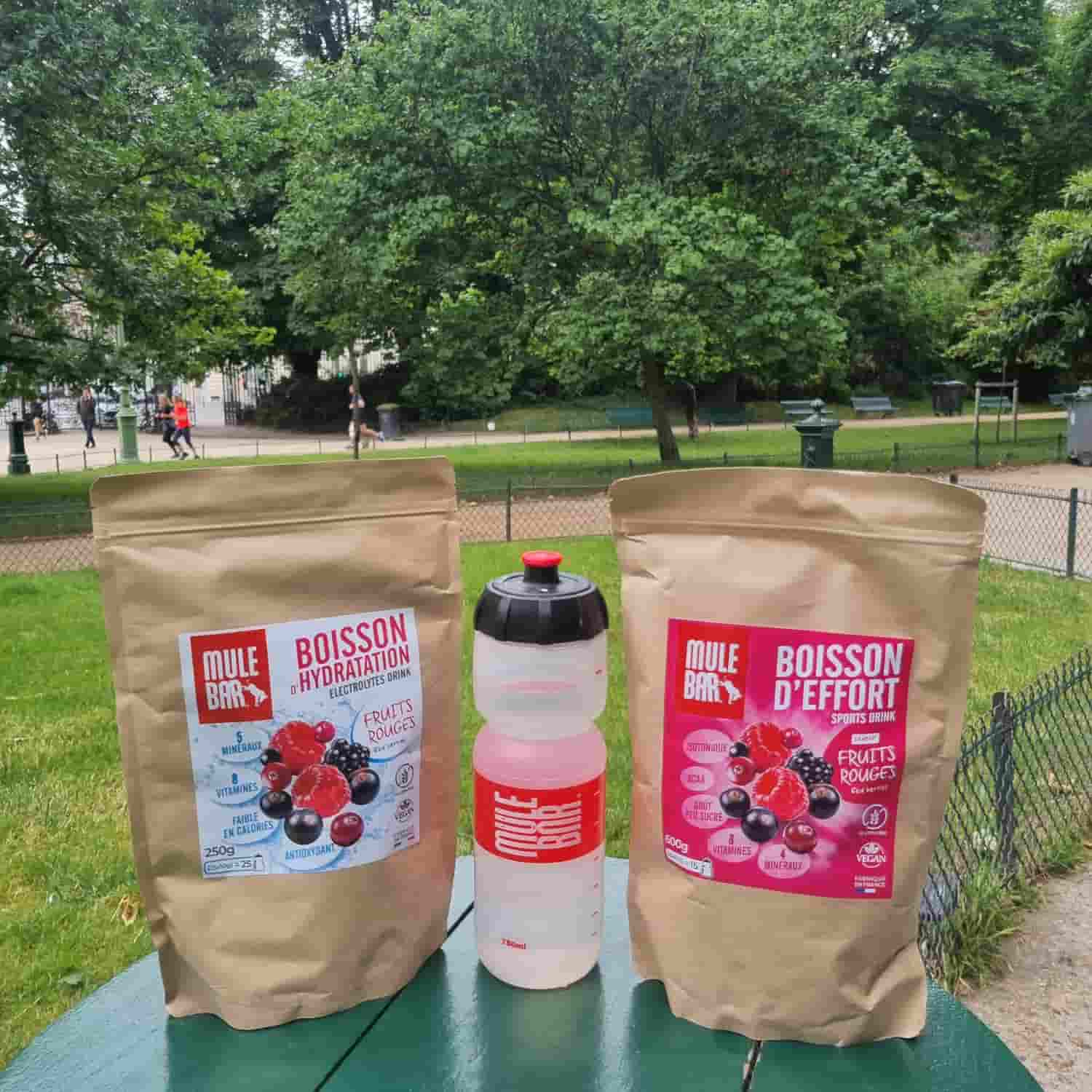
Ingredients
Calcium gluconate, potassium bicarbonate, corn maltodextrin, sodium bicarbonate, red berries flavor, magnesium citrate, citric acid, vitamins (C, B3, E, B1,B2, B6, B9, D), beetroot powder , zinc bisglycinate, sweetener: sucralose.
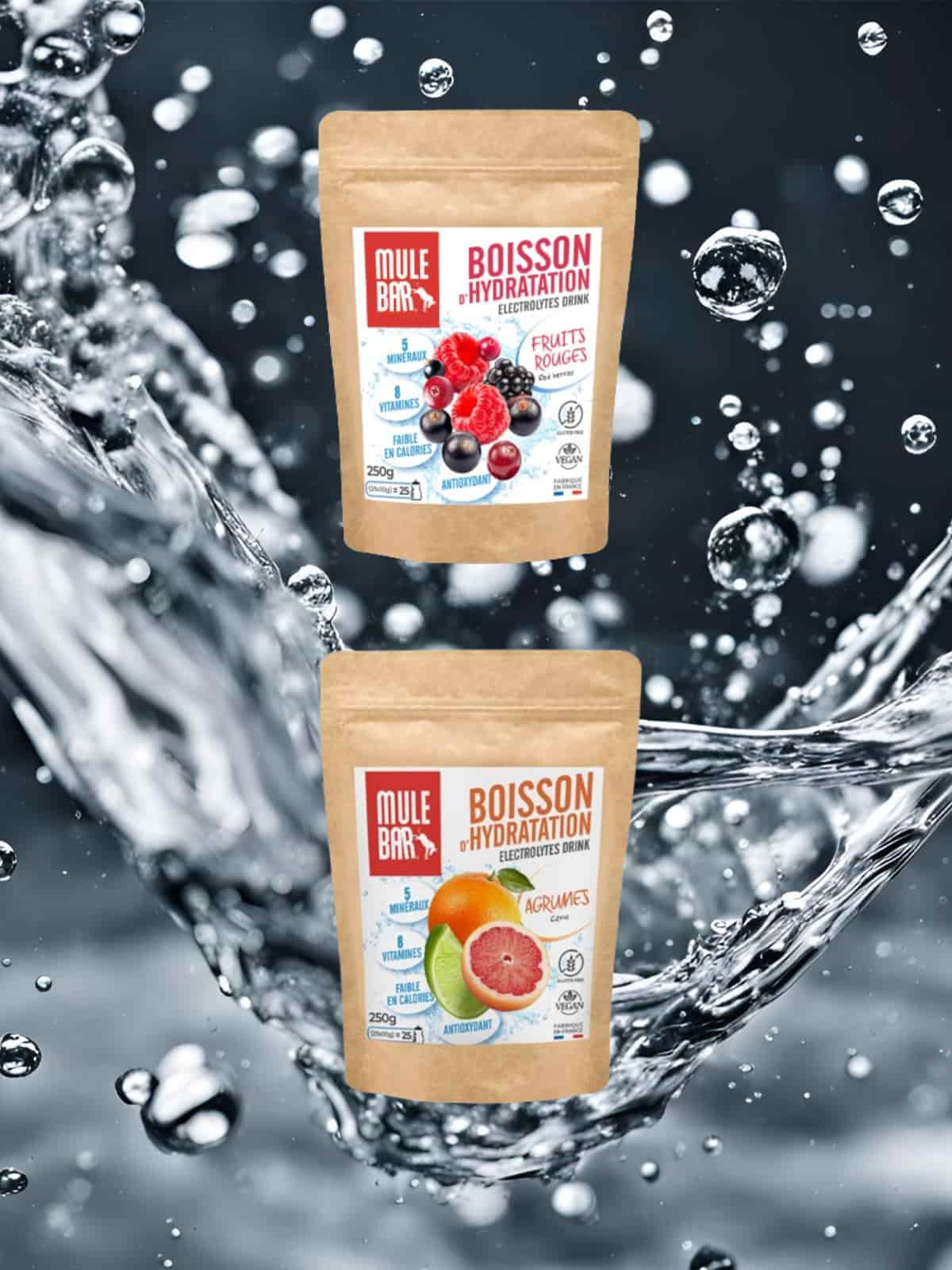
Nutritional values
| For 100g | For 10g | RNV* / 10g | |
|---|---|---|---|
| Energy (kJ) | 448,00 | 44,80 | |
| Energy (kCAL) | 112,00 | 11,20 |
|
| Fat (g) | 0,00 | 0,00 | |
| of which saturated fatty acids (g) | 0,00 | 0,00 | |
| Carbohydrates (g) | 24.6 | 2.8 | |
| of which sugar (g) | 6.61 | 0,16 | |
| Fibres (g) | 1.15 | 0,12 | |
| Proteins (g) | 0,07 | 0,01 | |
| Salt (g) | 8.77 | 0,88 | |
| SUPPLEMENTED MINERALS | |||
| Sodium (mg) | 3507 | 351 | |
| Potassium (mg) | 7527 | 753 | 38% |
| dont Bicarbonates (mg) | 21.1 | 2.11 | Calcium (mg) | 2403 | 240 | 30% |
| Magnesium (mg) | 1520 | 152 | 41% |
| Zinc (mg) | 40,5 | 4,05 | 40% |
| SUPPLEMENTED VITAMINS | |||
| Vitamin E (mg) | 48,90 | 4,89 | 41% |
| Vitamin C (mg) | 324,60 | 32,50 | 41% |
| Vitamin B1 (mg) | 6,30 | 0,63 | 58% |
| Vitamin B6 (mg) | 5,70 | 0,57 | 41% |
| Vitamin B2 (mg) | 5,70 | 0,57 | 41% |
| Vitamin B3 (mg) | 64,90 | 6,49 | 41% |
| Vitamin B9 (µg) | 811,50 | 81,20 | 41% |
| Vitamin D (µg) | 20,30 | 2,03 | 41% |
| * Nutritional Reference Values (UE regulation n°1169/2011) | |||
